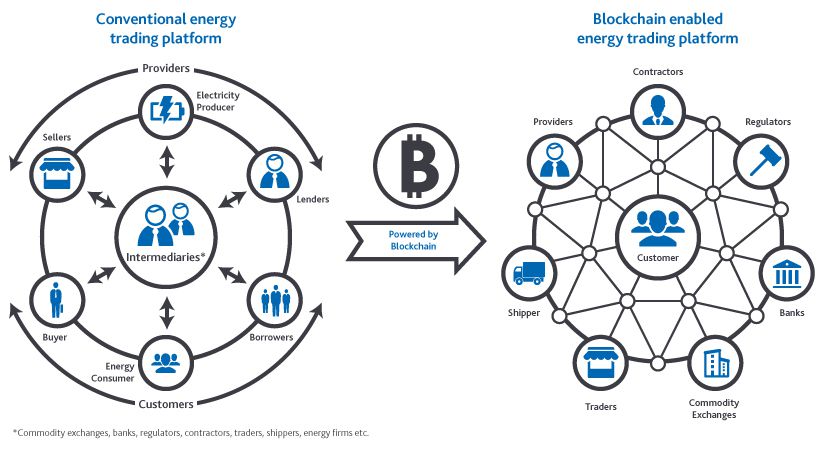Published on May 4, 2018 by Chetali Varshney
Suppressed oil prices over the past four years have led to numerous questions on how energy efficiency companies should address operational challenges. Although players have traditionally deployed heavy technology solutions, blockchain technology seems to be a holistic answer to many issues. It has already made its impact felt in the financial services industry and is now being widely experimented by more industries, including energy.
Blockchain technology can transform an energy company’s business model centered on its core supply chain into a decentralized system, reducing transaction process time and costs, and increasing compliance.
Why energy companies are keen to adopt blockchain technology
Over 100 cases of blockchain use have been identified so far, and several pilot projects have been launched, covering processes such as supply chain contract management, peer-to-peer (P2P) and wholesale energy trading/settlement, and billing and payments. Other elements in the energy ecosystem – such as electric vehicle (EV) charging and renewable energy credit (REC) trading – may also benefit from blockchain technology.
The following are some of the issues these initiatives have addressed:
-
Supply chain challenges – Blockchain increases data transparency by bringing all users on to single platform and mitigating compliance issues. It also helps to reduce cyber fraud by providing better encryption levels for transactions and maintaining an audit track of events.
-
Inefficiencies in energy commodity transactions – Blockchain eliminates intermediary costs, ensures faster transactions by streamlining processes, normalizes data formats across multiple organizations, and reduces risk of fraud and invalid transactions. Estimates show that companies can save upwards of 30% of process costs.
-
Management of grid and neighborhood electricity trading – Blockchain brings all electricity providers and consumers on to a single platform, where they buy and sell energy using cryptocurrency. This process provides a secure payment system, is transparent to all in the network and enhances grid security.
Increasing support from energy companies, governments and venture capitalists
A new ecosystem of energy blockchain start-ups is emerging, with investments of over USD1bn raised in the past two years for expanding business or starting new projects. Energy companies have also started taking initial steps to venture into this space:
-
Ethereum based blockchain technology already being adopted in Energy sector. Recently Chile started using Ethereum’s blockchain in order to record energy sector statistics
-
A consortium of energy firms including BP, Royal Dutch Shell, Statoil etc. will develop blockchain powered digital plaform for energy trading by the end of 2018
Energy sector players started using blockchain – sample of projects
-
The energy industry has already adopted blockchain technology based on the Ethereum platform. Chile recently started using the Ethereum blockchain to record energy-industry statistics.
-
A consortium of energy firms – including BP, Royal Dutch Shell, and Statoil – plans to develop a blockchain-powered digital platform for energy trading by end-2018.
-
Siemens and LO3 Energy established Brooklyn Microgrid, a transactive energy platform, where energy trading is conducted via blockchain.
-
Sun Exchange (a P2P online marketplace where anyone in the world can buy solar cells and lease them out to customers) has developed its platform on the Ethereum blockchain.
-
Energy tokens – such as Encoin, Suncoin, and Bankymoon – reward renewable energy production, distribution and storage with cryptocurrency.
The way ahead…
While adoption of blockchain technology in the energy industry is currently on the transactive side of business, we believe other processes – such as accounting and billing, asset tokenization, and security – will soon be included. This would trigger a powerful transformation in business models and initiate process changes at the enterprise level. However, we believe the energy industry’s adoption of blockchain technology would have to overcome several regulatory and technological hurdles. Regulation has not been able to keep up with the changes brought about by blockchain technology, and infrastructure for supporting blockchain technology is still in its infancy.
Sources:
Blockchains potential in the energy industry
Can blockchain save the energy sector?
Use Cases for Blockchain Technology in Energy & Commodity Trading
BP, Shell lead plan for blockchain-based platform for energy trading
Smart Contracts To Disrupt Energy Trading
Blockchain in Energy & Industry Raises $1 Billion – and Heads into Challenging Times
What's your view?
About the Author
Chetali Varshney has over 3 years of experience in strategic research and consulting role, covering various sectors including technology, oil and gas, heavy machinery, and automotive. She holds an MBA degree from ICFAI Business School, Hyderabad and is a mechanical engineer from Maharishi Dayanand University.
Like the way we think?
Next time we post something new, we'll send it to your inbox







